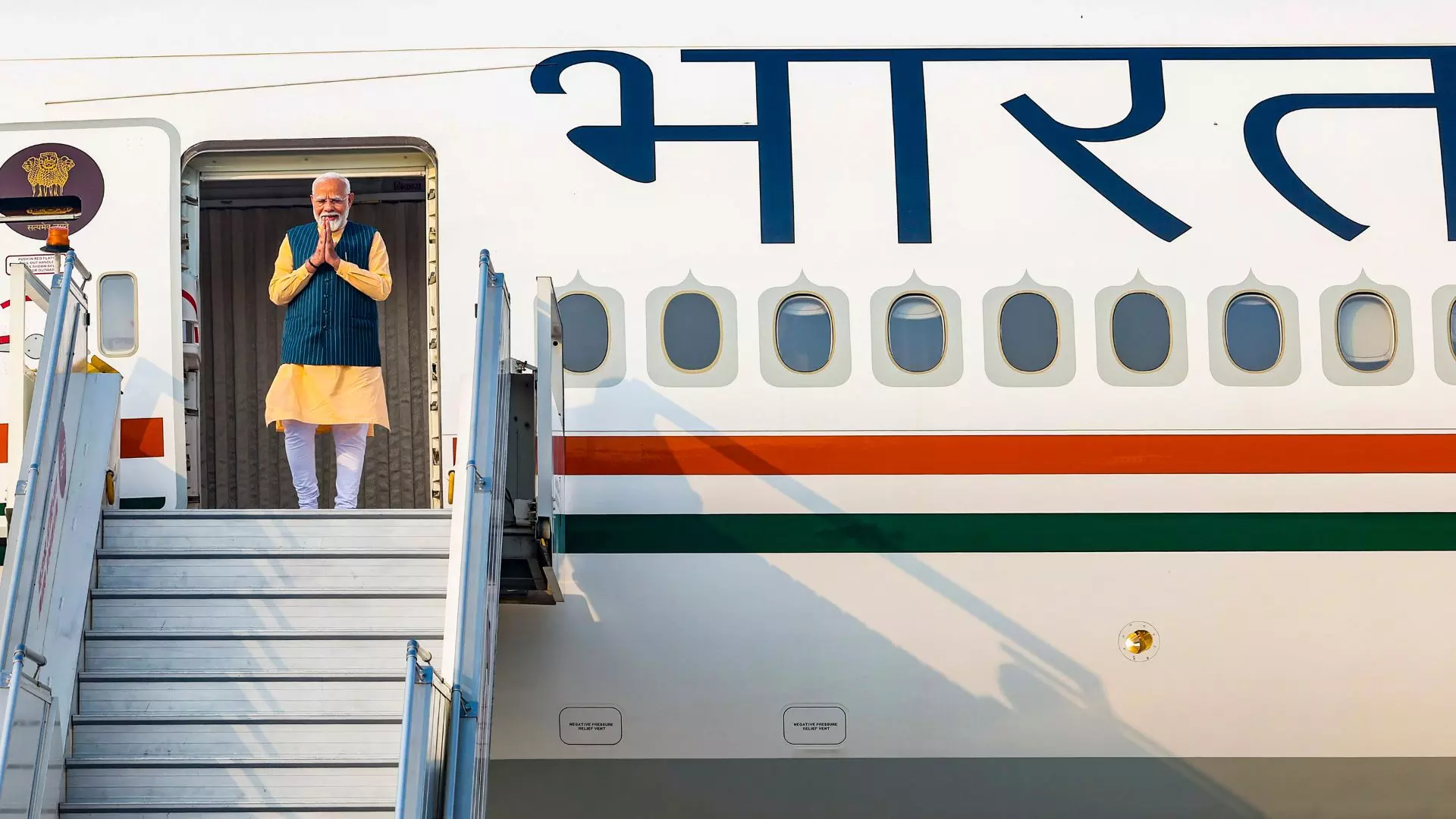Syed Ata Hasnain | ‘It’s not the time for war’: A mantra for our planet
India navigates complex international relations amidst crises in Ukraine, Gaza, and emerging tensions in Af-Pak, highlighting global strategic uncertainties

India has to keep insisting on its stance of opposition to civilian targeting, something it has strictly adhered to in all warlike situations that it has faced. A certain moral leverage always devolves as a result of this stance, which India’s Prime Minister has publicly backed. (File Image: PTI)
Three years ago, I imagined that the effect of the American military’s withdrawal from Afghanistan and the energised search for peace in the Middle East, through fresh initiatives such as the Abraham Accords and the Western Quad, would usher in a better chance for peace. I could not have been more mistaken. Prime Minister Narendra Modi’s significant advice to President Vladimir Putin of Russia in September 2022 about war, and then again recently during his recent visit to Moscow, bears much significance in these dismal times. In this recent period this has been the only pragmatic advice by a world leader, urging the world to step back and examine which way things are going for humanity. Predictability can be cast aside for almost all international strategic issues of worth and diplomacy may never have been as challenging as it is now. As India’s strategic stature rises, it finds itself getting increasingly embroiled in big power games where uncertainty rules and the potential of war adds to the turbulence. An update on a few situations may draw interest.
In Ukraine, what is certain is that uncertainty will prevail without a military outcome. The capitulation of Ukraine to the renewed Russian military initiatives is unlikely for now. A Carnegie-sponsored opinion poll conducted in mid-March 2024 appeared to point to a reasonably strong self-belief in Ukraine’s public. However, whether this confidence translates into reality is another question. Ukraine’s leader Volodymyr Zelenskyy has to wrestle between reality and the “make believe” which inevitably accompanies tough situations. It’s clear that the restoration of boundaries by aiming to push the Russians out of Donbas is something unrealistic. The Russian capability to wage war appears reasonably enhanced and its forces have learnt their lessons well.
Will Donald Trump’s potential return as the US President in November enable him to stop the war in Ukraine? A lot of people think so, mainly because of his general disdain for the US commitment to Nato and to European security. Whatever be Mr Trump’s beliefs, to dump Ukraine and allow the Russians a military victory involving the occupation of territories beyond Donbas is something Europe can ill afford. Even the biggest Trump supporters would not go along with seeing the Russian flag over Kyiv. He would therefore have to do better than that. Does he have the potential? What Ukraine therefore needs is pragmatism and acceptance of a ceasefire without insistence upon the vacation of Donbas or any other areas having a dominant ethnic Russian population; an “as is where is” ceasefire. A break from hostilities may allow scope for the negotiations to open, on issues like retention of the current Ukrainian military capability or its dilution; or on potential membership of Nato and EU, the original trigger which started it all.
There is a China factor at play in the Russian confidence in Ukraine. The Chinese have much to gain in terms of future partnerships with Russia to balance the international power equations. However, India too has not stepped back from maintaining its long-standing relationship with Russia, extending to several areas of cooperation, despite a strong emerging relationship with the United States. India continues to remain insistent about its strategic autonomy. What is hurting Indian sensitivity is the large and ever-increasing quantum of civilian casualties in both Ukraine and Gaza. India has to keep insisting on its stance of opposition to civilian targeting, something it has strictly adhered to in all warlike situations that it has faced. A certain moral leverage always devolves as a result of this stance, which India’s Prime Minister has publicly backed.
The other war we should be concerned about is the one in Gaza. The one state/two states solutions are yet far from the mind as far as Palestine is concerned. A retrograde situation has emerged, where political solutions are unlikely to find their way to the agenda of any international and regional players for a fairly long time. The two negatives for India are, first the significantly reduced importance of its strategic linkages; in relation to the slowdown in association with the Western Quad, or I2U2. It still has several projects: the food corridor project, 300 MW renewable energy facility in Gujarat, integrated food parks, and hybrid renewable energy project, but the strategic aspects have now been comparatively relegated. With the possible return of Donald Trump to the White House, this equation is likely to receive impetus.
The second thing about the ongoing war in Gaza is that a foreign policy dilemma has emerged for India. Although India has handled its relationship with the US-Israel equation on very positive terms, it’s difficult to bridge the issue of Palestine, especially because of large-scale human rights violations. The current political leadership of Israel is hell bent on following the doctrine of “eliminating the last terrorist” in the Gaza Strip. What the leadership forgets is that human suffering inflicted beyond a threshold leads to diminishing of reasoning and rationale. The Middle East, long the crucible of political Islam, appeared to have been moving towards moderation in ideological outlook, especially in crucial nations like Saudi Arabia and the UAE. The Gaza war and the suffering of people there is likely to give a fillip to the forces of extremism, which strongly advocate the ideology of political Islam. Israel cannot sustain this war without US support and President Biden has helped in the cause of extending the Israeli military campaign. No change should be expected if Donald Trump comes to power. For India it’s a moral dilemma and its potential role as a peace pathfinder is not likely to find much traction here.
In Ukraine, what is certain is that uncertainty will prevail without a military outcome. The capitulation of Ukraine to the renewed Russian military initiatives is unlikely for now. A Carnegie-sponsored opinion poll conducted in mid-March 2024 appeared to point to a reasonably strong self-belief in Ukraine’s public. However, whether this confidence translates into reality is another question. Ukraine’s leader Volodymyr Zelenskyy has to wrestle between reality and the “make believe” which inevitably accompanies tough situations. It’s clear that the restoration of boundaries by aiming to push the Russians out of Donbas is something unrealistic. The Russian capability to wage war appears reasonably enhanced and its forces have learnt their lessons well.
Will Donald Trump’s potential return as the US President in November enable him to stop the war in Ukraine? A lot of people think so, mainly because of his general disdain for the US commitment to Nato and to European security. Whatever be Mr Trump’s beliefs, to dump Ukraine and allow the Russians a military victory involving the occupation of territories beyond Donbas is something Europe can ill afford. Even the biggest Trump supporters would not go along with seeing the Russian flag over Kyiv. He would therefore have to do better than that. Does he have the potential? What Ukraine therefore needs is pragmatism and acceptance of a ceasefire without insistence upon the vacation of Donbas or any other areas having a dominant ethnic Russian population; an “as is where is” ceasefire. A break from hostilities may allow scope for the negotiations to open, on issues like retention of the current Ukrainian military capability or its dilution; or on potential membership of Nato and EU, the original trigger which started it all.
There is a China factor at play in the Russian confidence in Ukraine. The Chinese have much to gain in terms of future partnerships with Russia to balance the international power equations. However, India too has not stepped back from maintaining its long-standing relationship with Russia, extending to several areas of cooperation, despite a strong emerging relationship with the United States. India continues to remain insistent about its strategic autonomy. What is hurting Indian sensitivity is the large and ever-increasing quantum of civilian casualties in both Ukraine and Gaza. India has to keep insisting on its stance of opposition to civilian targeting, something it has strictly adhered to in all warlike situations that it has faced. A certain moral leverage always devolves as a result of this stance, which India’s Prime Minister has publicly backed.
The other war we should be concerned about is the one in Gaza. The one state/two states solutions are yet far from the mind as far as Palestine is concerned. A retrograde situation has emerged, where political solutions are unlikely to find their way to the agenda of any international and regional players for a fairly long time. The two negatives for India are, first the significantly reduced importance of its strategic linkages; in relation to the slowdown in association with the Western Quad, or I2U2. It still has several projects: the food corridor project, 300 MW renewable energy facility in Gujarat, integrated food parks, and hybrid renewable energy project, but the strategic aspects have now been comparatively relegated. With the possible return of Donald Trump to the White House, this equation is likely to receive impetus.
The second thing about the ongoing war in Gaza is that a foreign policy dilemma has emerged for India. Although India has handled its relationship with the US-Israel equation on very positive terms, it’s difficult to bridge the issue of Palestine, especially because of large-scale human rights violations. The current political leadership of Israel is hell bent on following the doctrine of “eliminating the last terrorist” in the Gaza Strip. What the leadership forgets is that human suffering inflicted beyond a threshold leads to diminishing of reasoning and rationale. The Middle East, long the crucible of political Islam, appeared to have been moving towards moderation in ideological outlook, especially in crucial nations like Saudi Arabia and the UAE. The Gaza war and the suffering of people there is likely to give a fillip to the forces of extremism, which strongly advocate the ideology of political Islam. Israel cannot sustain this war without US support and President Biden has helped in the cause of extending the Israeli military campaign. No change should be expected if Donald Trump comes to power. For India it’s a moral dilemma and its potential role as a peace pathfinder is not likely to find much traction here.
Apart from the two geographical zones of tension and violence, Ukraine and Gaza, an area of concern for India is the Af-Pak region, where a new dynamic seems emerging in the form of a reviving movement towards extremism. Pakistan is already battling hordes of sponsored terrorists from Afghanistan and many home-grown ones. Despite this, it has chosen to up the ante in the Jammu region of J&K on the basis of a perception that its relevance in the region is eroding. While India focuses on the foreign policy challenges of avoiding war in the other two regions, it ironically faces an awkward situation in J&K, where the early retrieval of full stability is a must and the conduct of Assembly elections an equal challenge. Escalation control in the season of “no war” must form a part of our security policy, at least for now.
( Source : Deccan Chronicle )
Next Story

